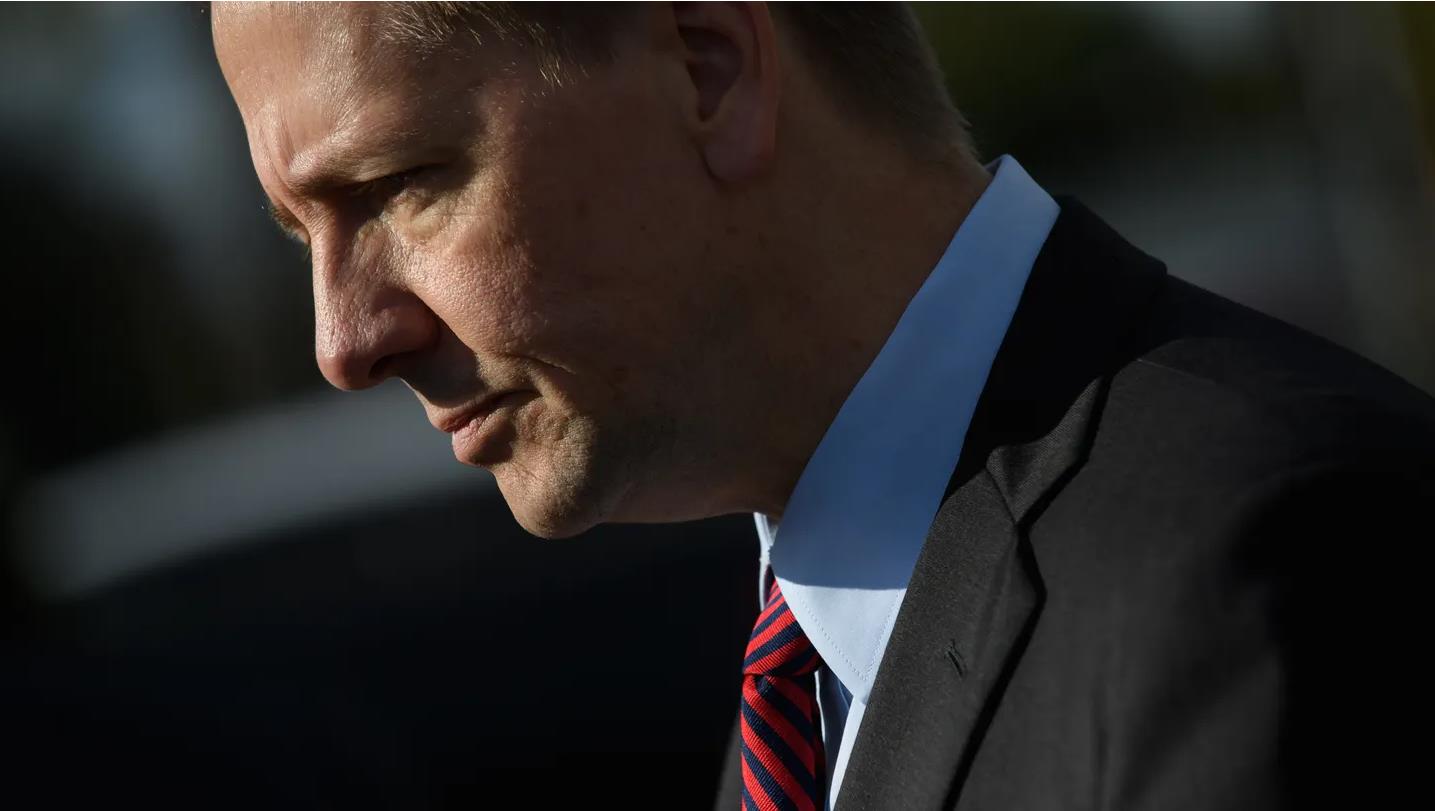Education Department ‘weaponizing’ student aid office for political purposes, new report argues
The Biden administration is disadvantaging working, minority and underprivileged students by “weaponizing” the federal student aid process to target for-profit trade schools, according to a conservative watchdog group.
The American Accountability Foundation (AAF) released an explosive new report using research and documents obtained by public records requests to argue the Education Department is working with a network of left-wing figures and Democratic state attorneys general to pursue a “witch hunt” against career colleges — also known as trade, vocational, or proprietary schools.
“Actions of the Biden Department of Education have weaponized the department and the student aid process for political purposes,” the report states. “The administration’s biased focus on forcing students to choose state-run or traditional private colleges and universities, even when those may not be the best fit, has driven them to build a biased Federal Student Aid office that appears to exist nearly exclusively to prosecute its director’s vendetta against career colleges. Specifically, the administration has undertaken several steps that are putting working class students at a disadvantage by unfairly targeting career colleges.”
Much of the AAF’s report focuses on Richard Cordray, the Education Department’s chief operating officer of federal student aid. He previously served as director of the Consumer Financial Protection Bureau (CFPB) and attorney general of Ohio. According to the AAF, Cordray is a leading force behind the Biden administration’s alleged targeting of career colleges.
“Richard Cordray is up to his old tricks again. After politicizing and weaponizing the CFPB under Obama to attack and harass the left’s enemies, now he’s doing the same at the Department of Education,” AAF President Tom Jones told Fox News Digital. “This report reveals in shocking and disturbing detail how he is trying to force students to choose state-run or traditional private colleges and universities, instead of career or vocational schools, even if it means blocking opportunities for working-class Americans who benefit the most from these institutions. Once again, he’s been caught red-handed trying to force Americans to run their lives as the leftist elite deem proper.”
According to the report, Cordray has staffed his office with “left-wing ideological warriors” to pursue an agenda against career colleges, most of which are for-profit institutions.
“AAF’s research shows that Richard Cordray has aggressively staffed his office with partisan ideologues. His hires — while all ideological leftists — tend to split into two camps: first, a reconstitution of his team from the CFPB, and a cadre of activists from state attorneys general offices and outside activist groups,” the report states. “When brought together into the office, Cordray has assembled an experienced team of political appointees, advocates with ties to left-wing groups, and liberal attorneys who know how to use the tools of government and its allies on the left to punish businesses they disfavor.”
The report specifically describes many of these individuals by name, providing brief descriptions of their backgrounds.
The AAF also obtained emails from state attorneys general offices showing Cordray’s office reaching out to significantly more Democrats than Republicans to discuss student loan amnesty at a time when there were more Republican attorneys general in office — a discrepancy that, the report argues, was due to politics.
“Despite Republicans holding the majority of the attorney general offices in the United States when Cordray was recruiting for an enforcement position, his office reached out to 21 Democrat offices while only reaching out to 11 Republican offices,” the report added. “A particularly problematic bias when the position was listed as ‘fully remote’ and could have been in a state like Texas, whose office was not on the email.”
AAF’s research indicates Cordray has been in close contact with a wide network of left-wing groups, advocates, lobbyists and lawyers that support large-scale student loan forgiveness and have been outspoken against for-profit colleges. The report details many of these by name and how they connect to Cordray.
The AAF report additionally calls out what it describes as a “revolving door” of left-wing partisans switching between government and outside special interest groups to make money and push their agenda against career colleges. The report specifically details several individuals that it describes as being part of this revolving door.
Toby Merrill, for example, is currently earning a comfortable salary with the Education Department after recently working for the Project on Predator Student Lending. She also worked to sue the Education Department in the past and is married to a top deputy handling student loan and career college issues in the office of the Massachusetts attorney general.
The Education Department dismissed the AAF report as an effort by a “dark money group” to undermine its work to protect students.
“It’s no surprise that special interests and partisan dark money groups object to the department’s relentless work to protect students and taxpayers,” a spokesperson told Fox News Digital. “Any institution that breaks financial aid rules and cheats students into a lifetime of unaffordable debt will be held accountable, period.”
Career colleges first came under fire with the Obama administration, which in 2016 started the Federal Student Aid Enforcement Unit. While the office was purportedly created to conduct oversight on all federal education funds, most of its focus was directed toward for-profit schools.
The Obama administration also adopted a “gainful employment” rule allowing the Education Department to cut off aid to a school’s students if a certain number of them had too much debt relative to their earnings.
The Obama Education Department additionally launched the Borrower’s Defense to Repayment (BDR) program, which allows students taking out loans to receive debt relief if they can demonstrate their school misled or otherwise defrauded them.
These policies had a devastating effect on for-profit career colleges. The value of the seven largest publicly traded proprietary education school operators plummeted from a combined $51 billion to $6 billion during the Obama administration, according to DC Journal.
In contrast, the Trump administration effectively closed the student financial aid enforcement office and raised the threshold for students to be able to seek BDR relief.
Then, the Biden administration relaunched an enforcement office under federal student aid and in its 2024 budget request asked for a 600% increase in funding from the prior year. The administration also tightened regulations on how much revenue for-profit schools can generate from federal programs and sought to impose a more rigid “gainful employment” rule on privately-owned schools. The latter rule would not have applied to public and private colleges.
In March, the administration issued new guidance outlining plans to require private college leaders to assume personal liability for unpaid debts that institutions owe to the government when they “fail to operate in a financially responsible way.” Weeks later, the Education Department said it was cutting off Florida Career College, a for-profit institution, from participating in federal student aid programs for improperly allowed students without a high school diploma or equivalent credential to test into eligibility for federal aid. As a result, the school will be denied revenue essential to its survival.
The Biden administration, Democrats in Congress and various advocacy groups argue they want to ensure students get good value for their education when they take out loans. Last month, progressive House lawmakers called on the administration to use executive power to “curb predatory behaviors” among for-profit colleges. They also said the Education Department should warn students who apply to “low-value” colleges — schools that leave them with high debt and low earning potential. The administration has created but not yet published a list of schools it deems as bad value in a bid to shame them to do better.
Researchers have found that some for-profit colleges leave students with high debt and low pay. According to the left-leaning think tank Third Way, for example, more than 60% of for-profit institutions “show their low-income students earning less than the average high school graduate within 10 years of entering their institution.”
However, traditional colleges often leave students in a similar situation. In a 2020 Wall Street Journal column, economist Richard Vedder and policy analyst Andrew Gillen highlighted several prestigious public and nonprofit colleges that fail the gainful employment test, such as Columbia University’s bachelor’s program in rhetoric and composition and a master’s degree in fine and studio arts at Yale. The column even flagged law and optometry degrees from distinguished universities.
Meanwhile, according to a 2020 report from the National Center for Education Statistics, just two-thirds of students who begin a traditional four-year college program earn a degree from that school in six years or less, while only one-third of students who enroll full-time at a two-year community college finish a degree in four years or less.
The AAF also notes in its report that parents, full-time workers, minorities, veterans and first-generation college students often choose career colleges in higher proportions than traditional college students from middle- or upper-class homes.
“By way of providing an education to many low-performing high school students and nontraditional adult learners, the academic achievement of many career colleges students will fail to match traditional college students, but this is an unfair comparison, given the differing foundation for each of these student types,” the report states. “In contrast, and a better comparison, is that career college students tend to perform as well or better than community college students.”
Because career colleges reportedly enroll only about 7.5% of students, the AAF and other critics argue the Biden Education Department and others who support its efforts are devoting an unreasonably disproportionate amount of time and resources to for-profit proprietary schools.
In January, the Government Accountability Office reported the Education Department’s enforcement office has not “completed work vital to improving oversight of colleges” and hasn’t completed or updated “procedures for selecting colleges for investigations, conducting investigations, and imposing penalties on colleges that are found to be engaging in substantial misrepresentation. Education has lacked these complete and updated procedures for at least 6 years.”
Trace Urdan, managing director at the investment firm Tyton Partners, was similarly critical of the Education Department’s enforcement efforts.
“It would go a long way toward Richard Cordray’s credit if he were to actually use this same initiative to hold some nonprofit schools accountable by similar standards,” Urdan said in 2021. “But I’m not holding my breath for that outcome.”
According to the AAF, Cordray “has taken the Department of Education’s Federal Student Aid office from an objective protector of students to a partisan shop pursuing a witch hunt against an industry Cordray personally opposes.” The report claims Cordray and like-minded individuals in positions of influence want to “force students and parents to attend traditional colleges and universities staffed and run by their friends on the left even if it means denying options to students.”
In contrast, the Education Department says its investigations into for-profit schools are meant to probe potential violations of laws and regulations.




